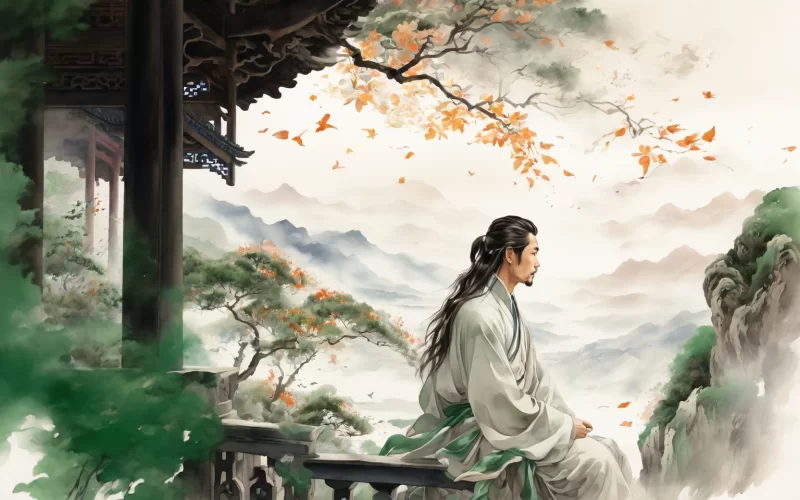The trader’s boat goes with the fair wind;
He’ll sail afar to earn his bread.
He is like a bird in the cloud,
Leaving no more traces overhead.
Original Poem
「估客乐」
李白
海客乘天风,将船远行役。
譬如云中鸟,一去无踪迹。
Interpretation
Composed during Li Bai's travels in the Wu-Yue region, this poem adopts a Southern Dynasties folk-song tradition. During the Tang Dynasty, unprecedented commercial prosperity gave rise to an active merchant class navigating rivers and seas. Li Bai, observing their lifestyle, created more than a mere depiction of mercantile life—this work is a profound reflection where the poet's own sense of life's transience ("life as sojourning") merges with the merchants' fate, portraying a deep spiritual connection between the traveler-poet and the traveling merchant.
First Couplet: "海客乘天风,将船远行役。"
Hǎi kè chéng tiānfēng, jiāng chuán yuǎn xíng yì.
Seafarer rides the heaven-sent wind, Launching his ship on far campaigns.
The opening sketches a dynamic seafaring image. "Rides the heaven-sent wind" shows the merchant's resourcefulness in leveraging opportunities while hinting at his subjection to uncontrollable natural forces, foreshadowing the journey's uncertainty. "Far campaigns" is particularly insightful—equating commercial voyages with military expeditions subtly reveals the hardships and risks behind prosperous trade, lending it a solemn, tragic quality.
Second Couplet: "譬如云中鸟,一去无踪迹。"
Pìrú yún zhōng niǎo, yī qù wú zōngjī.
Like a bird in the clouds, it vanishes without trace.
This couplet is the poem's soul. The metaphor "bird in the clouds" carries dual meanings: it depicts the merchant's freedom and unfettered movement, yet more profoundly reveals his isolated existence and informational seclusion. "Vanishes without trace" signifies both spatial immensity and unpredictable fate, deeply infused with Li Bai's own "wandering the world" life experience.
Holistic Appreciation
The poem's artistic charm lies in its high symbolism and universality. Superficially, it captures a typical moment in a Tang merchant's life; fundamentally, it transcends occupational specifics to become a collective portrait of all wanderers and seekers. With his genius insight, Li Bai refined the "merchant" image into an eternal literary symbol: they embody freedom yet carry loneliness; they pursue profit at the cost of permanent separation from stable life and social bonds. The concise language and vast意境 create a complete narrative arc from "departure" to "disappearance" in just twenty characters, full of poignant tragic beauty.
Artistic Merits
- Precise Imagery and Sublimation: Core images like "heaven-sent wind" and "bird in the clouds" fit mercantile reality while carrying deep symbolic meaning, elevating concrete objects to fateful signs.
- Fusion of Folk Song Charm and Personal Style: The poem inherits the simplicity and freshness of folk songs while injecting Li Bai's unique boldness and desolation, perfectly blending old themes with new meaning.
- Profound Sentiment Beneath Calm Tone: Using straightforward description and metaphor with an objective tone, the poem conveys deep compassion and lament—the toil of "far campaigns" and the vastness of "without trace"—through understatement.
- Open-Ended Conclusion: Ending with "without trace" offers no judgment or resolution, leaving the merchant's fate to the unknown, giving readers ample space for reflection.
Insights
This poem poses a timeless question about freedom and cost. The "merchant" figure mirrors modern strivers who leave hometowns to battle opportunities and risks. It enlightens us that any pursuit of a broader world and freer life inevitably entails separation from familiar environments, deviation from stable order, and vast uncertainty ahead. Li Bai's verse shows that while praising the entrepreneurial spirit, we should also deeply understand the loneliness and sacrifice behind it. True wisdom may lie in recognizing this inevitable fate and finding inner balance and resilience between the passion for chasing "heaven-sent winds" and bearing the desolation of leaving "without trace."
About the poet

Li Bai (李白), 701 - 762 A.D., whose ancestral home was in Gansu, was preceded by Li Guang, a general of the Han Dynasty. Tang poetry is one of the brightest constellations in the history of Chinese literature, and one of the brightest stars is Li Bai.












